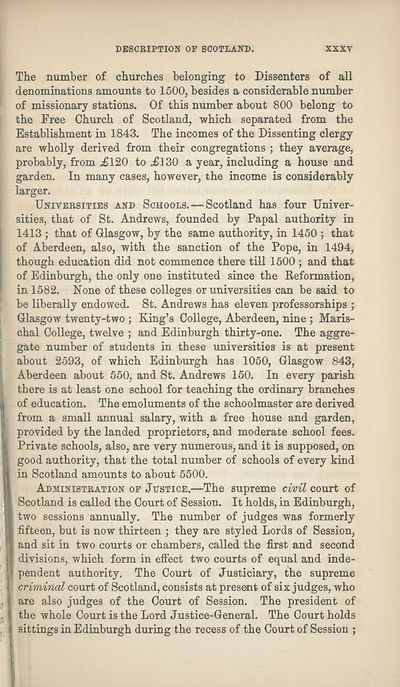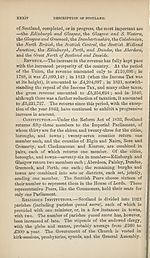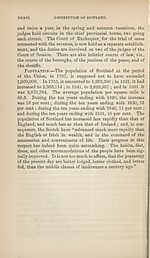Download files
Complete book:
Individual page:
Thumbnail gallery: Grid view | List view

DESCRIPTION OF SCOTLAND.
XXXV
The number of churches belonging to Dissenters of all
denominations amounts to 1500, besides a considerable number
of missionary stations. Of this number about 800 belong to
the Free Church of Scotland, which separated from the
Establishment in 1843. The incomes of the Dissenting clergy
are wholly derived from their congregations ; they average,
probably, from £120 to £] 30 a year, including a house and
garden. In many cases, however, the income is considerably
larger.
Universities and Schools. — Scotland has four Univer¬
sities, that of St. Andrews, founded by Papal authority in
1413 ; that of Glasgow, by the same authority, in 1450 ; that
of Aberdeen, also, with the sanction of the Pope, in 1494,
though education did not commence there till 1500; and that
of Edinburgh, the only one instituted since the Reformation,
in 1582. None of these colleges or universities can be said to
be liberally endowed. St. Andrews has eleven professorships ;
Glasgow twenty-two ; King’s College, Aberdeen, nine ; Maris-
chal College, twelve ; and Edinburgh thirty-one. The aggre¬
gate number of students in these universities is at present
about 2593, of which Edinburgh has 1050, Glasgow 843,
Aberdeen about 550, and St. Andrews 150. In every parish
there is at least one school for teaching the ordinary branches
of education. The emoluments of the schoolmaster are derived
from a small annual salary, with a free house and garden,
provided by the landed proprietors, and moderate school fees.
Private schools, also, are very numerous, and it is supposed, on
good authority, that the total number of schools of every kind
in Scotland amounts to about 5500.
Administration of Justice.—The supreme civil court of
Scotland is called the Court of Session. It holds, in Edinburgh,
two sessions annually. The number of judges was formerly
fifteen, but is now thirteen ; they are styled Lords of Session,
and sit in two courts or chambers, called the first and second
divisions, which form in effect two courts of equal and inde¬
pendent authority. The Court of Justiciary, the supreme
criminal court of Scotland, consists at present of six judges, who
are also judges of the Court of Session. The president of
the whole Court is the Lord Justice-General. The Court holds
sittings in Edinburgh during the recess of the Court of Session ;
XXXV
The number of churches belonging to Dissenters of all
denominations amounts to 1500, besides a considerable number
of missionary stations. Of this number about 800 belong to
the Free Church of Scotland, which separated from the
Establishment in 1843. The incomes of the Dissenting clergy
are wholly derived from their congregations ; they average,
probably, from £120 to £] 30 a year, including a house and
garden. In many cases, however, the income is considerably
larger.
Universities and Schools. — Scotland has four Univer¬
sities, that of St. Andrews, founded by Papal authority in
1413 ; that of Glasgow, by the same authority, in 1450 ; that
of Aberdeen, also, with the sanction of the Pope, in 1494,
though education did not commence there till 1500; and that
of Edinburgh, the only one instituted since the Reformation,
in 1582. None of these colleges or universities can be said to
be liberally endowed. St. Andrews has eleven professorships ;
Glasgow twenty-two ; King’s College, Aberdeen, nine ; Maris-
chal College, twelve ; and Edinburgh thirty-one. The aggre¬
gate number of students in these universities is at present
about 2593, of which Edinburgh has 1050, Glasgow 843,
Aberdeen about 550, and St. Andrews 150. In every parish
there is at least one school for teaching the ordinary branches
of education. The emoluments of the schoolmaster are derived
from a small annual salary, with a free house and garden,
provided by the landed proprietors, and moderate school fees.
Private schools, also, are very numerous, and it is supposed, on
good authority, that the total number of schools of every kind
in Scotland amounts to about 5500.
Administration of Justice.—The supreme civil court of
Scotland is called the Court of Session. It holds, in Edinburgh,
two sessions annually. The number of judges was formerly
fifteen, but is now thirteen ; they are styled Lords of Session,
and sit in two courts or chambers, called the first and second
divisions, which form in effect two courts of equal and inde¬
pendent authority. The Court of Justiciary, the supreme
criminal court of Scotland, consists at present of six judges, who
are also judges of the Court of Session. The president of
the whole Court is the Lord Justice-General. The Court holds
sittings in Edinburgh during the recess of the Court of Session ;
Set display mode to:
![]() Universal Viewer |
Universal Viewer | ![]() Mirador |
Large image | Transcription
Mirador |
Large image | Transcription
| Antiquarian books of Scotland > Scotland/Scots > Black's picturesque tourist of Scotland > (41) |
|---|
| Permanent URL | https://digital.nls.uk/130028682 |
|---|
| Description | Thousands of printed books from the Antiquarian Books of Scotland collection which dates from 1641 to the 1980s. The collection consists of 14,800 books which were published in Scotland or have a Scottish connection, e.g. through the author, printer or owner. Subjects covered include sport, education, diseases, adventure, occupations, Jacobites, politics and religion. Among the 29 languages represented are English, Gaelic, Italian, French, Russian and Swedish. |
|---|

